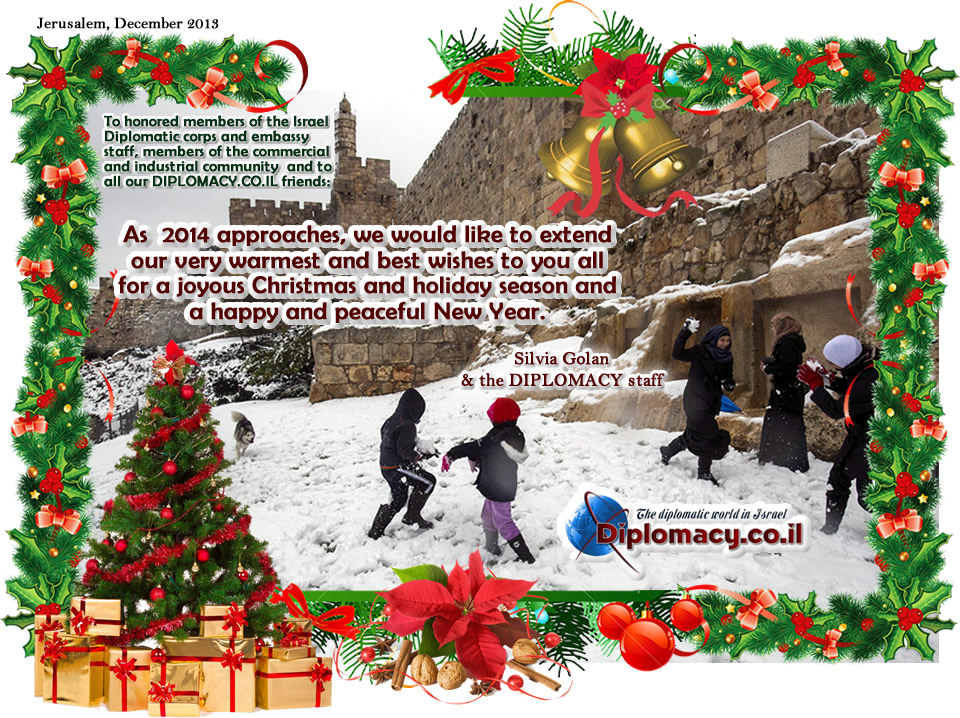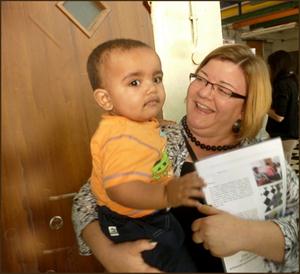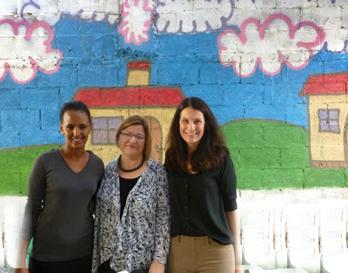Society
- Details
- Written by Silvia G Golan
Christmas & New Year greetings from Diplomacy
- Details
- Written by KKL
|
|
Molina said he wanted to make the strongest oath for the peace and security of Israel.
“I want to say publicly that you can count as your friend a brother nation who respects you and admires you and who recognizes the battle you have had to fight for so many years, and with so many sacrifices on the path seeking peace,” he said. “I am convinced and certain that Israel deserves peace, security, prosperity and well being for its entire nation. These are the wishes of a brother nation Guatemala.”
Efi Stenzler and Eli Aflalo present President Molina (right) with a silver-plated pinecone, with Susan Michaeli. Photos: KKL-JNF Archive |
 |
The Guatemalan president embarked on a tour of the Rabin Center and the Triguboff gardens, led by Yitzhak Rabin’s daughter Dalia Rabin. The tour was then followed by a festive reception hosted by KKL-JNF. Dalia Rabin welcomed some 200 guests, and talked about the Rabin Center, which celebrates the life and work of the deceased Israeli Prime Minister Yitzchak Rabin.
Noting the similarity between the journeys from military general to political leader that President Molina shares with her father, Rabin said that she was honored to have the Guatemalan leader visit the center and expressed her gratitude to KKL-JNF for their continuing support of the center. She also thanked KKL Guatemala President Susan Michaeli for her hard work, which enabled the evening to take place.
“I want to thank from the bottom of my heart our dear friends from KKL-JNF, Efi Stenzler and Eli Aflalo for their ongoing support,” she said.
The president emphasized the traditional friendship between the Guatemalan and the Israeli people, noting the difficult moments his own country had passed to reach peace and democratic elections in 1996.
“We have had the opportunity to have an extensive visit here to the State of Israel and we have been able to value even more the friendship that exists between the people and the government of Israel and the people and the government of Guatemala,” said Molina. “In these two days, we have been able to see the reality in which the nation of Israel lives. We have seen the complexity of the situation with which the people live here.”
|
|
During the visit, the president met with Israeli Prime Minister Benjamin Netanyahu and planted an olive tree in the KKL-JNF Grove of Nations in Jerusalem. The delegation was also taken on a helicopter tour over Israel in order to see firsthand the impact KKL-JNF projects have on the country.
Molina noted the State of Israel’s turbulent history, beginning with the U.N. decision for Israeli independence which was fiercely opposed by the Arab countries, leading Israel into war even from its very first days. From there started the contradiction of Israel’s search for peace while still having to fight wars, he said.
“Nevertheless today we see that State of Israel has been almost a miracle. We have seen an Israel with a modern society, with a democratic society, with a tolerant society, but also with technological advances in various fields. That is the result of the efforts of an entire nation, not the result of one leader. There have been many leaders, and even those who have lost their life, like Yitzhak Rabin, who, while searching between the battle of continuing war and seeking peace, have had to give their life in order for the State of Israel to survive and continue to seek peace.”
Commenting on the difficulty of making decisions in the United Nations and other places without knowing the reality of the situation, Molina pointed out how important visiting Israel was.
“Seeing the reality will help make the right decision,” he said.
Thanking the president for his country’s continuous support of Israel, KKL-JNF World ChairmanEfi Stenzler and co-Chairman Eli Aflalo presented Molina with a mounted silver-plated pine cone, one of five pine cones which survived and was recovered from the Carmel Forest following the devastating forest fire there three years ago. Stenzler said that this was the first of the pine cones to be presented to an honored visitor.
“We thank you and the entire delegation from Guatemala for your visit to our country, which has moved us greatly and raised hopes for the future. We are certain that the warm relations that have been forged during this visit will strengthen the ties between the people of Israel and the people of Guatemala,” said Stenzler.
- Details
- Written by Yad B'yad Association
The Yad B’Yad Association noted its 30th anniversary in a gala performance of the musical "My Fair Lady" starring Nathan Datner and Shani Cohen. All incomes of the show (held Saturday, 2/11/13) where dedicated to fund activities of the association and to open two more Warm Homes for children at risk.
The gala hosted ambassadors, business and media personas as well as the members of the Yad B'Yad Association friends circle.
The Yad B’Yad Association was founded in 1982 by Ms. Shelly Hoshen, psychologist and pre-school age counselor. Mrs. Hoshen was guided by an educational philosophy which claims that all children deserve the nurturing and love that can ensure a strong foundation for a meaningful life and an opportunity to realize their full potential, and that this foundation must be built as early as possible. Unfortunately, there are still far too many children in Israel whose families struggling to provide this all-important environment. Thus the Yad B’Yad Association has dedicated itself to various projects designed to fill this need.
The Association runs 10 Warm Homes in the center of the Israel, where children at risk between the ages of three and a half and seven come after kindergarten and school hours. The children stay in the houses until 18:00 PM and receive everything that their families and neighborhood are unable to provide: Hot meals, cognitive enrichment, emotional support, appreciation of values and normative behavior, and an abundance of warmth and love from the professional staff.

Mrs Shelly Hoshen with the cast of "My fair Lady". Photography: Raphael Delouya
- Details
- Written by Jonathan Danilowitz

H.E Mr Lars Faaborg-Andersen Ambassador-designate of the Delegation of the European Union to the State of Israel, his wife Mrs Jean and Mr Zinger
Members of the Diplomatic Corps in Israel were invited at the offices of the Israel Olympic Committee on Sunday afternoon 17thNovember.
Mr. Ephraim (Ziggy) Zinger addressed the audience with a short history and highlights of the Olympic Games, and the guests were then invited for refreshments and the “Experience”. The hosts made sure that this exclusive presentation was for the diplomatic corps alone.
Ambassadors and Diplomatic Corps' visit to the Olympic Committee was organized in collaboration with Diplomacy-PR team, Silvia Golan and Aviva Shwartz.
Israel’s Olympic history goes back only to 1952 (the country was but four years old!) and has been a roller-coaster ride of tears; tears of joy, but also of intense sadness. Israel’s Olympic memory will always be tinged by the sadness of the games in Munich in 1972 when Arab terrorists slaughtered 11 Israeli athletes in the Olympic Village.
On the other hand, Israelis have been the proud winners of six medals over the years, including one gold medal. Considering the size of the country and the fact that sport has never played an intense role in Israeli society, the country’s pride and joy – as if the medal is “ours”, not the athletes’ – is quite understandable.
The Olympic Experience is a multi-media exhibition lasting about 40 minutes, where guests are led through the sparkling history of the games worldwide, with special accent on Israel, from the rebirth of the event 1896 (women were banned at the first games!) to the present.
It becomes clear why the Olympic Games attracts the attention of the entire world. No other international sporting event – and there are dozens – is quite like it. The scenes of Israeli sportsmen and women receiving their medals are inspiring – and brought tears of joy to many of those attending.
“The Olympic Experience” can be enjoyed at the Israeli Olympic Center, 6 Shitrit Street (2nd floor) in the Hadar Yosef area of Tel Aviv, the very center of Israeli sports.
There are English and Hebrew versions and the groups can be up to 50 people, 8 times a day. Prior arrangements and reservations are essential (call 03-7955900 ext1) http://www.olympic.one.co.il

Mr Zinger with H.E. Prahlad K . Prasai, embassador of Nepal and wife
Photos Silvia Golan
- Details
- Written by American Embassy & British Embassy Tel Aviv


Photos: Mary Knight
Ms. Julie Fisher, wife of U.S. Ambassador to Israel Dan Shapiro, and Mrs. Celia Gould, wife of British Ambassador to Israel Matthew Gould, visited the Eritrean Women’s Community Center in south Tel Aviv on November 6. During the visit, Ms. Fisher and Mrs. Gould learned about the child care, health, education, and support services the center provides to Eritrean women in the community. Ms. Fisher and Mrs. Gould also had an opportunity to meet mothers, play with children, and enjoy home-cooked Eritrean food.
Zebib Sultan, who arrived in Israel three years ago from Eritrea, started the center in July 2012 with assistance from Amnesty International. Sultan decided to start the center to address a need for Eritrean women to be supported by women who speak their language and understand their culture.
“It was a meaningful visit, filled with informative first-hand accounts of the plight of Eritrean women, men and children,” Ms. Fisher said. “Hearing about the initiatives to prevent domestic abuse, provide pregnancy support and educatio , as well as learning about the health care challenges they face, was compelling."
Mrs. Gould said, “It was an honor to meet Zebib and see first-hand the amazing work her and the team at the community center do every day in a difficult and complicated situation. Their compassion and hard work makes a huge difference in the lives of some of the most vulnerable women in Israeli society.”
The center provides low-cost child care services so the women can work during the day, and offers enrichment classes in the evening, such as English, Hebrew, family planning, and computer literacy. The center also coordinates a group of men and women who work on eradicating domestic violence in the Eritrean community by raising awareness and assisting victims.
Ms. Fisher and Mrs. Gould were accompanied to the center by Ms. Mary Knight, wife of U.S. Deputy Chief of Mission William Grant, and Mrs. Jo Jefferson, wife of the British Military Attaché to Israel, Colonel Nigel Jefferson.
This visit continued Ms. Fisher’s outreach to Israel’s diverse communities. On October 30, Ms. Fisher visited an early childhood day care center in the Bedouin village of Abu Kaf and Hagar Association’s Jewish Arab bilingual school in Be’er Sheva.











